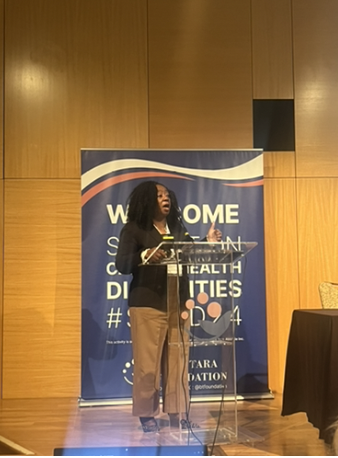An Equity and Social Justice Opportunity
By Dr. Richa Parikh
In this talk, Dr. Nadine J. Barrett discusses the effects of implicit bias among physicians on patients. A study reporting results from implicit association tests across 34 countries over ten years revealed that implicit and explicit attitudes and stereotypes globally favored the same groups that are valued highest in the US i.e. white/light-skinned, thin, young, straight/heterosexual, males; this suggests that implicit bias is a global problem [1]. <20% of patients with cancer participate in clinical trials, with majority being white, middle-class men and women (76-85%), and patient groups carrying the greatest burden of disease are in fact grossly underrepresented in clinical trials, especially those with race other than whites, those from rural areas, low-income groups, elderly, and LGBTQ community.
Historical and current medical and research atrocities against people of color, trust, limited community and patient engagement, broader inequities across all systems and lack of a diverse workforce are some barriers leading to a lack of diversity in clinal trials. Diversity in clinical research is essential to enhance generalizability, explore differences across races and promote equitable access to research.
Another study evaluating perspectives on minority recruitment among research and clinical professionals revealed that recruitment interactions with potential minority participants were perceived to be challenging, these participants were not perceived as ideal study candidates and a combination of these two factors led to providers withholding clinical trials from these participants [2]. It also showed that addressing research misconceptions to build trust was a commonly employed strategy when recruitment practices were tailored to minority participants.
A primary reason why individuals agreed to participate in clinical trials is because they were asked and informed. This led to the development of ASCO’s ‘Just Ask’ program, a certificate program to build skills to enhance engagement, recruitment and retention of diverse participants in clinical research. ABI-RACE, PROCEED, DOCETAXEL, PANTHER are some examples of studies in prostate cancer with outcomes stratified by race. Creating a solid recruitment and retention strategy with a diversity plan and appropriate budget, providing implicit bias and anti-racism training for teams, ensuring diversity in workforce, addressing cultural barriers including language, examining proximity and access to participation, encouraging community engagement, diverse patient and community advisory council, developing DEI research committees and teams are some strategies to address a lack of diversity in clinical research.
References:
1. Charlesworth TES, Navon M, Rabinovich Y, Lofaro N, Kurdi B. The project implicit international dataset: Measuring implicit and explicit social group attitudes and stereotypes across 34 countries (2009-2019). Behav Res Methods. 2023 Apr;55(3):1413-1440.
2. Niranjan SJ, Martin MY, Fouad MN, Vickers SM, Wenzel JA, Cook ED, Konety BR, Durant RW. Bias and stereotyping among research and clinical professionals: Perspectives on minority recruitment for oncology clinical trials. Cancer. 2020 Jan 1;126(9):1958-1968.
Author Bio:
Dr. Richa Parikh received her medical degree from Grant Government Medical College, India. She completed IM residency from University of Arkansas for Medical Sciences. She is currently a third-year Hematology/Oncology fellow at Karmanos Cancer Institute. She will be joining Emory University as Assistant Professor/myeloma faculty in Fall 2024.
COI: Served on advisory board for Sanofi.





